Have you ever wondered about the little creatures that wriggle in your garden? Earthworms play a big role in keeping your soil healthy. But are earthworms good for gardens? Many gardeners swear by these slimy helpers, but what makes them so special?
Imagine digging in the dirt and finding a happy earthworm. Did you know that these creatures can take a tired garden and bring it back to life? They eat dead leaves and other materials. This helps create nutrient-rich soil that plants love.
In fact, a garden with plenty of earthworms often grows stronger vegetables and colorful flowers! So, if you want to know more about how these little helpers can improve your garden, keep reading. You might be surprised at what earthworms can do!
Are Earthworms Good For Gardens? Discover Their Benefits!
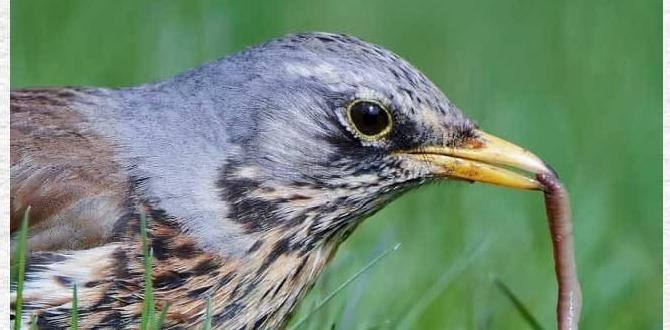
Are Earthworms Good for Gardens?
Earthworms are amazing helpers in gardens. They dig through soil, making it loose and easy for plants to grow. Their waste, called castings, acts like a nutrient-rich fertilizer. This helps plants become stronger and healthier. Did you know that one earthworm can eat its weight in soil each day? By inviting these little creatures into your garden, you create a lively ecosystem. They boost soil health and support plant growth, making gardening easier and more fun!The Role of Earthworms in Soil Health
Importance of soil aeration and structure. Contribution to nutrient cycling and organic matter decomposition.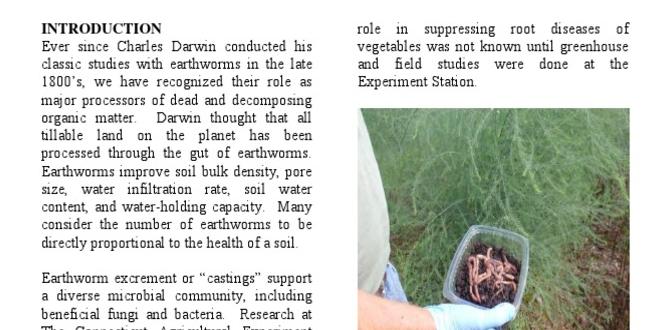
Earthworms are like tiny superheroes for soil health! They wiggle through the ground, making it airy and loose. This soil aeration lets plants breathe better—just like we need fresh air! Plus, earthworms munch on dead leaves and other organic matter, speeding up the process of breaking it down. This helps recycle nutrients back into the soil, making your garden thrive. Without these squirmy friends, your garden would be less happy!
| Earthworm Benefits | Description |
|---|---|
| Soil Aeration | Earthworms create tunnels, allowing air and water to reach plant roots. |
| Nutrient Cycling | They help decompose organic matter, returning nutrients to the soil. |
Benefits of Earthworms for Garden Plants
Natural fertilizer production through castings. Improved water retention and drainage properties.
Earthworms are like little gardeners. They help plants grow strong and healthy. First, they make natural fertilizer through their castings. This means they turn food scraps and dirt into rich soil. It gives plants the nutrients they need! Next, earthworms improve how water moves in the soil. They help it soak in and also drain better. This keeps the plants from getting too much or too little water.
Why are earthworms important in gardens?
Earthworms create natural fertilizer and help plants with water management.
Key Benefits:
- Natural fertilizer through castings
- Better water retention
- Improved drainage
Types of Earthworms and Their Functions
Description of common garden earthworm species. Differences in behavior and ecological roles.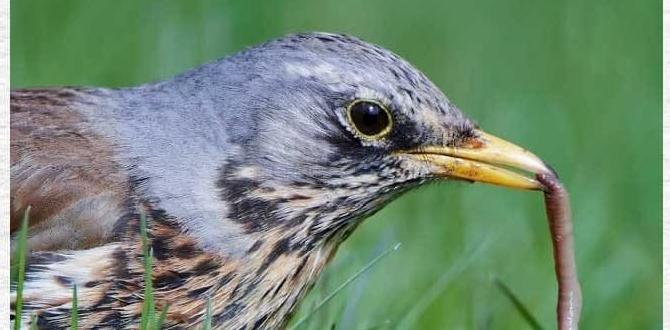
Many types of earthworms live in gardens. They play different roles in the soil. Here are a few common species:
- Red Wigglers: These earthworms help break down compost. They thrive in rich, organic material.
- Nightcrawlers: These worms dig deep burrows. They improve soil aeration and drainage.
- Garden Earthworms: These worms stay near the surface. They turn leaf litter into nutrient-rich soil.
Each type has unique behaviors. Some prefer compost, while others dig deep into the soil. This diversity boosts soil health, making gardens thrive.
Why Are Earthworms Important for Gardens?
Earthworms help aerate the soil and break down organic matter. They create tunnels that allow water and air to reach plants.How to Attract Earthworms to Your Garden
Best practices for creating a wormfriendly environment. Recommended organic matter and mulching techniques.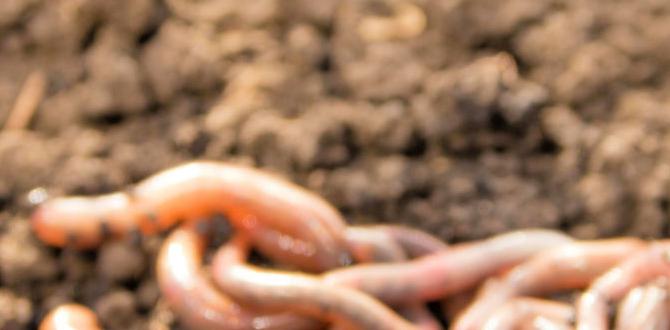
Want to invite earthworms to your garden? First, make it a cozy place! Start by adding organic matter like leaves, kitchen scraps, and grass clippings. Earthworms love this buffet! Mulching is also a great idea. It keeps the soil cool and moist. Worms enjoy soft soils, where they can wiggle around happily. So, toss on some mulch, and let your garden become the hottest spot in town for earthworms!
| Best Practices | Benefits |
|---|---|
| Adding organic matter | Creates food for worms |
| Using mulch | Maintains soil moisture |
| Avoiding chemicals | Keeps soil friendly |
Common Misconceptions About Earthworms
Debunking myths regarding earthworm impact on garden ecosystems. Clarifying the natural habitat preferences of earthworms.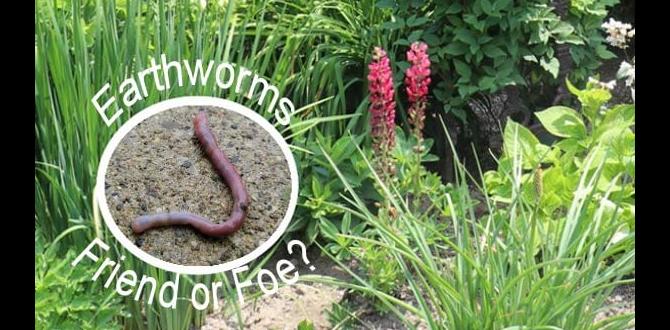
Many believe that earthworms are always the best pals for our gardens. However, some myths need busting! For example, earthworms don’t play well in certain dry areas. They prefer moist, rich soil, like the one found in healthy gardens. Another funny myth is that they can damage plant roots. In reality, they help plants by making soil airy and providing nutrients. So, let’s clear the air (or soil) about these wiggle worms!
| Myth | Truth |
|---|---|
| Earthworms harm roots | They actually help soil health! |
| All earthworms like the same habitat | They prefer damp and rich soil. |
Using Earthworms in Composting Systems
Benefits of vermiculture in home composting. How to start a worm bin for garden waste recycling.
Want to make your compost dance? Using earthworms can turn your garden scraps into garden gold! These little critters, known as “nature’s recyclers,” munch on waste and create nutrient-rich compost. Starting a worm bin is easy. Grab a container, add some soil, and toss in your kitchen scraps. Just remember, no citrus—earthworms can be a bit picky, like kids at a dinner table! Here’s a quick guide:
| Step | Description |
|---|---|
| 1 | Choose a bin with air holes. |
| 2 | Add damp newspaper for bedding. |
| 3 | Include food scraps (no meat). |
| 4 | Stir it up and keep it moist! |
With patience, you’ll create rich compost that helps your plants thrive. Who knew visiting the worm world could be so rewarding?
Monitoring Earthworm Populations in Your Garden
Methods to assess earthworm activity and numbers. Indicators of a healthy earthworm population and soil ecosystem.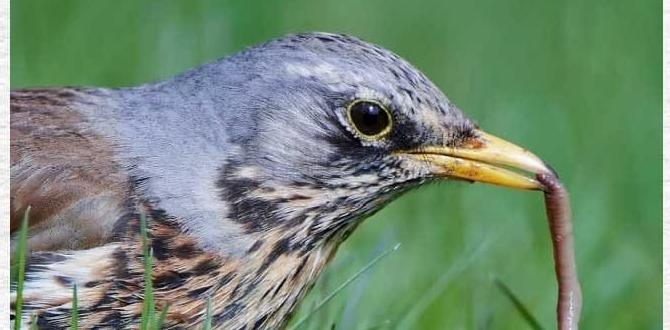
Checking how many earthworms live in your garden can be fun! You can use simple methods like digging small holes and counting worms. If a patch of soil has more than ten worms in a square foot, that’s a good sign. These squiggly friends help keep the ground healthy by munching on dead leaves and turning them into rich food for plants. Best of all, they don’t ask for lunch breaks! Here’s a quick table of signs to look for:
| Healthy Signs | Activity Level |
|---|---|
| Lots of worm activity | Great |
| Soil is dark and crumbly | Good |
| Smell of fresh earth | Excellent |
| Very few worms | Needs help |
Conclusion
In conclusion, earthworms are great for gardens! They improve soil health, help plants grow better, and make the garden more lively. You can attract earthworms by adding compost and keeping your soil moist. To learn more, check out gardening books or websites about worms. Happy gardening, and enjoy the benefits of these amazing little creatures!FAQs
How Do Earthworms Improve Soil Health And Structure In Gardens?Earthworms make soil better for plants. They dig tunnels, which helps air and water get into the ground. Their waste, called castings, adds nutrients that plants need to grow. When they eat dead leaves, they break them down and help create rich soil. This all makes your garden a happier and healthier place!
What Specific Benefits Do Earthworms Provide To Plant Growth And Nutrient Availability?Earthworms help plants grow by making the soil better. They burrow through the ground, which helps air and water reach roots. As they eat decaying leaves, they create worm poop, called castings. This poop is full of nutrients that plants need to be healthy. So, when you have earthworms in the soil, your plants can grow stronger and faster!
Are There Any Negative Impacts Of Having Earthworms In A Garden Ecosystem?Yes, there can be some negative effects of having earthworms in a garden. They might eat too many plant roots, which can hurt the plants. Some kinds of earthworms can also disturb the soil a lot, making it hard for other creatures to live there. Lastly, if we introduce the wrong type of earthworm, it can take over and harm local wildlife. So, while earthworms are usually good, we need to keep an eye on them!
How Can Gardeners Attract And Maintain A Healthy Population Of Earthworms In Their Soil?You can attract earthworms by adding compost and organic matter to your soil. Planting cover crops helps too. Keep the soil moist, but not too wet. Avoid using chemical fertilizers and pesticides, as they can hurt earthworms. Finally, let leaves and grass clippings stay in your garden to give earthworms food and shelter.
What Is The Role Of Different Earthworm Species In Organic Gardening Practices?Different earthworm species help gardens grow. They dig tunnels in the soil, which helps air and water get to roots. They also eat dead plants and poop out nutritious waste called castings. This waste feeds plants and makes the soil healthier. So, earthworms make our gardens stronger and more productive!







